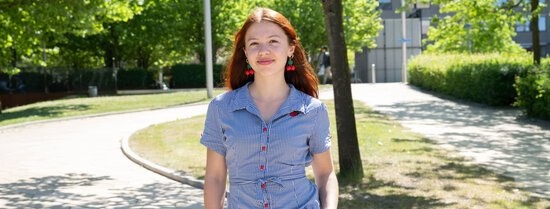The study programme in a nutshell
Within our Psychology programme, we utilise activating forms of education and learning in teams. We work with realistic, practical cases you can understand and solve with the information you find in scientific literature. During the follow-up class, you share your solution in small groups with your fellow students for further elaboration. You also work on in-depth assignments during class, which help you understand the literature better. Class discussions on scientific literature will strengthen your bond with fellow students and increase your chances of success in your studies. You will also develop professional skills which help minimise the gap between scientific knowledge and practice, with which you prepare for your future career. During our courses and practicals, you learn to think, act, research, and solve like a real psychologist.
Testimonials
First year
During the bachelor's programme in Psychology, you will learn about all the subject areas related to the field. In the first year, you will gain a good overview of psychology's basic and most fundamental disciplines. You will learn and discuss the various theories and concepts related to human behaviour, thinking, and emotions with your peers. In addition, you will learn practical psychological skills necessary to deal with this. For example, during the 'Personal Differences' course, you will investigate why our personalities make us behave differently. Parallel to this, you will learn how personality questionnaires work and how to analyse and report results as part of the 'Psychodiagnostics' practical. In other words, what you learn you apply during the practical meetings, gearing you up for working in practice.
You will also take courses in statistics, research methods, and academic and professional skills. You will learn, for instance, how to conduct professional conversations. Furthermore, you will learn how to conduct experiments. Sometimes, you will act as a test subject yourself. Finally, the last quarter of Year 1 is dedicated to gaining a more critical understanding of contemporary psychology from a historical and cross-cultural perspective.
Please note that mathematics (statistics) is important to this study.
Second and third year
In the second year, you will take more advanced courses in the fundamental topics and courses in the applied fields of Educational Psychology and Work and Organisational Psychology. After the third quarter of the second year of your bachelor's, you will have familiarised yourself with all the subareas of psychology. Afterwards, you will choose a specialisation track starting in the last quarter of Year 2.
In the third year of the bachelor's, you will have the opportunity to broaden your horizon. In the first quarter of Year 3, you will sign up for a minor, which can be organised by our university or another university in the Netherlands. The minor allows you to explore topics beyond the realm of psychology. The second quarter of Year 3 is dedicated to elective courses within the field of psychology, which link to different master's tracks offered by our department. Examples are "Forensic and Legal" and "Mind in Society (Brain and Cognition)". The electives can help you choose your master's and the career you wish to pursue. You can also spend the first period of Year 3 on an exchange at a foreign university (limited spots available).
During the second half of the third year, you will once more take courses in the specialisation area of psychology that you chose. You conclude your bachelor's degree with a thesis in which you address a psychological research question scientifically.
Please note that mathematics (statistics) is important to this study.
The curriculum may be subject to change. No rights may be derived from this information.
Bachelor 1
Bachelor 2
Period 4 Fan out and specialise
Bachelor 3
General information
Information session: What will my Ba3 year look like?
Disclaimer: the information in the presentation can be subject to change.
Bachelor 3: Specialisation in Brain and Cognition
Period 1
Minor / Exchange*
*Kindly note that participation in an exchange is subject to a selection process, as the number of available spots is limited. More info will be shared during your studies.
Period 2
Motivation, Self regulation and Performance
*Kindly note that participation in an exchange is subject to a selection process, as the number of available spots is limited. More info will be shared during your studies.
Period 4
Bachelor 3: Specialisation in Clinical Psychology
Period 1
Minor / Exchange*
*Kindly note that participation in an exchange is subject to a selection process, as the number of available spots is limited. More info will be shared during your studies.
Period 2
Local to Global
Motivation, Selfregulation and Performance
*Kindly note that participation in an exchange is subject to a selection process, as the number of available spots is limited. More info will be shared during your studies.
Period 4
Bachelor 3: Specialisation in Education and Development
Period 1
Minor / Exchange*
*Kindly note that participation in an exchange is subject to a selection process, as the number of available spots is limited. More info will be shared during your studies.
Period 2
Local to Global
Motivation, Selfregulation and Performance
*Kindly note that participation in an exchange is subject to a selection process, as the number of available spots is limited. More info will be shared during your studies.
Period 4
Bachelor 3: Specialisation in Work and Organisational Psychology
Period 1
Minor / Exchange*
*Kindly note that participation in an exchange is subject to a selection process, as the number of available spots is limited. More info will be shared during your studies.
Period 2
Local to Global
Motivation, Self regulation and Performance
*Kindly note that participation in an exchange is subject to a selection process, as the number of available spots is limited. More info will be shared during your studies.

